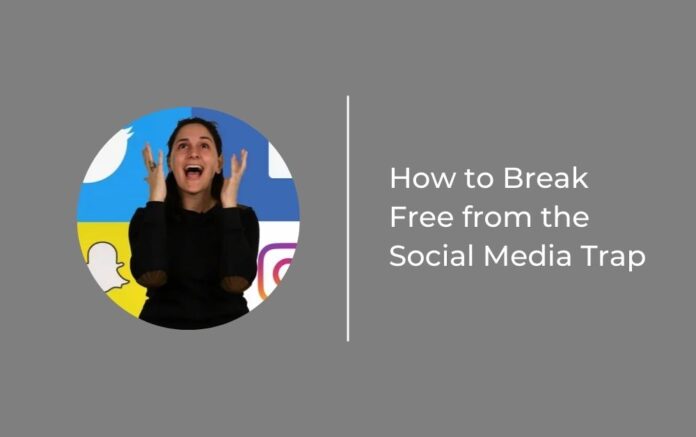Social media has become an integral part of our lives. We use it to connect with friends, share our experiences, and stay updated with the world. However, excessive use of social media can lead to negative consequences, including stress, anxiety, and a decline in real-life interactions. This blog will provide practical tips and strategies to help you break free from the social media trap and lead a more balanced and fulfilling life.
Understanding the Social Media Trap
The Allure of Social Media
Social media platforms are designed to be addictive. They use algorithms to show us content that keeps us engaged and coming back for more. The instant gratification of likes, comments, and shares can make us feel valued and important. This allure can make it hard to limit our time on these platforms.
Note – Ready to quit social media and reclaim your life? Start by setting daily time limits, creating tech-free zones, and engaging in offline hobbies. Connect with loved ones face-to-face, join local groups, and practice mindfulness to stay present. Prioritize self-care and seek professional help if needed. Take control today and enjoy a more balanced, fulfilling life without the constant distraction of social media!
Negative Impacts of Excessive Use
Spending too much time on social media can lead to various negative effects. It can increase feelings of loneliness, anxiety, and depression. Comparing ourselves to the seemingly perfect lives of others can lower our self-esteem. Additionally, it can reduce our productivity and interfere with our real-life relationships.
Recognizing the Problem
Signs of Social Media Addiction
Before we can break free from the social media trap, we need to recognize the signs of addiction. Some common signs include:
- Checking social media first thing in the morning and last thing at night.
- Feeling anxious or upset when you cannot access social media.
- Spending more time on social media than intended.
- Neglecting responsibilities and real-life relationships.
Assessing Your Social Media Use
Take a moment to assess your social media use. Track the time you spend on different platforms each day. Notice how you feel before, during, and after using social media. This assessment will help you understand the extent of your use and its impact on your life.
Setting Boundaries
Establishing Time Limits
One effective way to reduce social media use is to set time limits. Decide how much time you want to spend on social media each day. Use built-in tools on your devices to track and limit your usage. Stick to these limits to avoid falling back into old habits.
Creating Tech-Free Zones
Designate certain areas in your home as tech-free zones. For example, keep your bedroom free of phones and computers. This will help you create a space where you can relax and unwind without the distractions of social media.

Replacing Social Media with Healthy Activities
Engaging in Physical Activities
Physical activities are a great way to reduce the time spent on social media. Exercise releases endorphins, which improve your mood and overall well-being. Consider activities like walking, running, swimming, or joining a sports team.
Pursuing Hobbies and Interests
Rediscover hobbies and interests that do not involve screens. Whether it’s reading, painting, gardening, or playing an instrument, engaging in these activities can bring joy and fulfillment to your life. They also provide a productive and relaxing alternative to social media.
Improving Real-Life Relationships
Spending Quality Time with Loved Ones
Invest time in nurturing real-life relationships. Plan outings, dinners, or simple get-togethers with family and friends. Engaging in meaningful conversations and activities with loved ones can strengthen your bonds and reduce the need for social media validation.
Joining Social Groups and Communities
Consider joining clubs or groups that align with your interests. This could be a book club, a fitness group, or a volunteering organization. These groups provide opportunities to meet new people, make friends, and engage in activities you enjoy.
Practicing Mindfulness and Self-Care
Mindfulness Techniques
Practicing mindfulness can help you become more aware of your social media habits and their impact on your well-being. Techniques like meditation, deep breathing, and yoga can help you stay present and reduce the urge to constantly check social media.
Prioritizing Self-Care
Make self-care a priority in your life. This includes getting enough sleep, eating a balanced diet, and taking time to relax and unwind. Taking care of your physical and mental health will reduce the reliance on social media for comfort and validation.
Seeking Professional Help
When to Seek Help
If you find it challenging to reduce your social media use despite trying various strategies, it may be time to seek professional help. Signs that you may need help include:
- Feeling unable to control your social media use.
- Experiencing severe anxiety or depression related to social media.
- Neglecting important aspects of your life, such as work, school, or relationships.
Types of Professional Help
There are various types of professional help available for those struggling with social media addiction. These include:
- Therapists and counselors: They can help you understand the underlying reasons for your addiction and develop coping strategies.
- Support groups: Joining a support group can provide a sense of community and shared experiences.
- Digital detox programs: These programs offer structured plans to help you reduce or eliminate social media use.
Creating a Sustainable Digital Balance
Regular Digital Detoxes
Incorporate regular digital detoxes into your routine. This means taking scheduled breaks from all digital devices, including social media. These breaks can be for a few hours, a day, or even longer. Use this time to engage in offline activities and connect with the real world.
Developing a Healthy Relationship with Social Media
Aim to develop a healthy and balanced relationship with social media. This means using it intentionally and mindfully, rather than as a default activity. Set clear boundaries, engage in meaningful interactions, and avoid mindless scrolling.
Conclusion
Breaking free from the social media trap is not about completely eliminating social media from your life. It’s about finding a balance that allows you to enjoy the benefits of social media without letting it take over your life. By recognizing the problem, setting boundaries, replacing social media with healthy activities, improving real-life relationships, practicing mindfulness and self-care, seeking professional help when needed, and creating a sustainable digital balance, you can reclaim your time and well-being. Start implementing these strategies today and take the first step towards a healthier and more fulfilling life.
For more insightful articles related to this topic, feel free to visit getmeta.co

